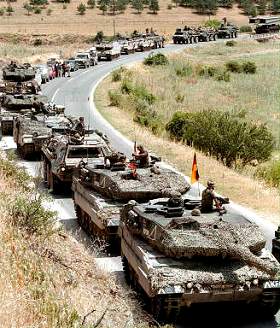 Serbian Prime Minister Mirko Cvetkovic has called on the remaining Balkan war crimes fugitives to surrender voluntarily after Tuesday’s arrest of Radovan Karadzic. He hailed Karadzic’s arrest as a major step for Serbia and urged others to voluntarily surrender. Cvetkovic claimed the arrest would open the way for reconciliation throughout the region, allow for better life in Serbia and the more efficient defence of its territorial integrity. Cvetkovic will be hoping for a major rapprochement with the EU as a reward for Karadzic’s high profile arrest.
Serbian Prime Minister Mirko Cvetkovic has called on the remaining Balkan war crimes fugitives to surrender voluntarily after Tuesday’s arrest of Radovan Karadzic. He hailed Karadzic’s arrest as a major step for Serbia and urged others to voluntarily surrender. Cvetkovic claimed the arrest would open the way for reconciliation throughout the region, allow for better life in Serbia and the more efficient defence of its territorial integrity. Cvetkovic will be hoping for a major rapprochement with the EU as a reward for Karadzic’s high profile arrest.And there is no doubting this is a major PR coup for the new PM installed in June this year. Radovan Karadzic declared himself president of the Republika Srpska (Bosnian Serb republic) when Bosnia-Herzegovina seceded from Yugoslavia in 1992. On 11 July 1995, the UN and NATO allowed Bosnian Serb forces to seize Srebrenica, despite it having been declared a United Nations “safe area.” Serb forces killed between 7,000 and 8,000 Bosnian men and boys in the week after the fall of the town. The International Criminal Tribunal for the former Yugoslavia (ICTY) ruled the crimes in Srebrenica to be genocide and Karadzic was removed from power by the Dayton Accords which ended the conflict later that year.
Now, reconciliation is starting to happen in Srebrenica. In 2003 a memorial service was held where security was provided in part by Bosnian Serb police while the Bosnian Serb Prime Minister spoke of “respect for the dead” and called for reconciliation. That same year the Bosnian Serb government admitted on local television station in the capital, Banja Luka for the first time its culpability for the slaughter at Srebrenica. The report revealed that the code name for the Srebrenica operation was "Krivaja 95" named for a small town in central Bosnia. The report named five detention centres where men were held and said a large number of Bosnian Muslims were executed nearby.
But while the leadership makes noises towards normalisation, the war leaders continue to resist arrest. With Karadzic nailed, the focus turns to Ratko Mladic who is also wanted for his role in Srebrenica. Mladic lived in the Serb capital Belgrade, under the protection of former president Slobodan Milosevic until he (Milosevic) was arrested in 2001. By 2004 Mladic was believed to be living under the protection Bosnian Serb military forces but hasn’t been heard of since.
In 2005, Human Rights Watch (HRW) complained that NATO did not do enough to capture Karadzic and Mladic. HRW’s European director Holly Cartner said NATO peacekeepers in Bosnia made only three confirmed attempts to arrest Radovan Karadzic in ten years despite numerous sightings of him. “You can count on one hand the number of times NATO has made real attempts to arrest Karadzic and Mladic,” she said. “Karadzic’s continuing freedom a decade after Srebrenica is a profound moral failure for NATO and the international community,
 Much of that “moral failure” has now been rectified. After spending years with impugnity in the extraordinary guise of a new age medical preacher, Karadzic was arrested two days ago in Belgrade. According to the BBC, he was finally uncovered by an unnamed foreign intelligence service and was kept under surveillance by local security forces for a couple of weeks before being arrest. A statement from Cvetkovic’s office said “Karadzic was located and arrested tonight [and] was brought to the investigative judge of the War Crimes Court in Belgrade, in accordance with the law on cooperation with the International Criminal Tribunal for the former Yugoslavia.” While it may take years for Karadzic to have his day in court, Bosnian Muslims could be forgiven for celebrating in Sarajevo. Cvetkovic may also be celebrating a major bargaining tool in the upcoming battles with Brussels.
Much of that “moral failure” has now been rectified. After spending years with impugnity in the extraordinary guise of a new age medical preacher, Karadzic was arrested two days ago in Belgrade. According to the BBC, he was finally uncovered by an unnamed foreign intelligence service and was kept under surveillance by local security forces for a couple of weeks before being arrest. A statement from Cvetkovic’s office said “Karadzic was located and arrested tonight [and] was brought to the investigative judge of the War Crimes Court in Belgrade, in accordance with the law on cooperation with the International Criminal Tribunal for the former Yugoslavia.” While it may take years for Karadzic to have his day in court, Bosnian Muslims could be forgiven for celebrating in Sarajevo. Cvetkovic may also be celebrating a major bargaining tool in the upcoming battles with Brussels.





